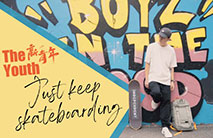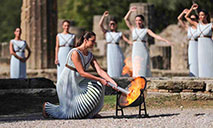Eight things to know about COVID-19 countermeasures at Beijing 2022
BEIJING, Oct. 25 (Xinhua) -- The first Playbook that explains anti-COVID-19 measures to be observed for the Beijing 2022 Olympic Winter Games was released on Monday.
This Playbook serves as the basis of the game plan to ensure that all Games participants and the people of China stay safe and healthy. Here are eight key points that all Games participants should know about the Playbook.
1. GUIDEBOOK TO SAFE AND SUCCESSFUL GAMES
The Playbook has been developed jointly by the Beijing Organizing Committee for the Olympic and Paralympic Winter Games 2022, the International Olympic Committee and the International Paralympic Committee.
The Playbook has two versions, one for athletes and team officials, and another applies for other stakeholders, referring to International Federations (IFs), marketing partners, workforce, broadcasters, press, and the Olympic and Paralympic Family.
As the Playbook emphasizes, the vaccination policy, a "closed-loop" management system and regular testing are among the vital elements that will enable the Games to take place safely.
2. VACCINATION
Participants are considered to be fully vaccinated according to the regulations of their country of residence at least 14 days prior to their departure to China, or if not eligible for full vaccination due to proven recent infection.
"Anyone who was not fully vaccinated will normally need to quarantine for 21 days upon arrival in Beijing. For athletes and team officials, exceptions may be granted on a case-by-case basis based on medical reasons," introduced Wang Quanyi, deputy director of Public Health Office of the Games Service Department of the Beijing 2022 Organizing Committee (BOCOG).
3. CLOSED LOOP
As the Playbook specifies, a closed loop system will be applied during Games participants' entire stay in China.
Within the closed loop, Games participants travelling to Beijing (and domestic staff in regular contact with other Games participants) will only be allowed to circulate in dedicated vehicles between permitted destinations (such as Games venues, accommodation facilities, and dining facilities).
"The closed loop will not restrict participants' free activities in the big 'bubble', and we'll provide local cuisine as well as other leisure facilities in the 'bubble'," said Huang Chun, deputy director general of the Pandemic Prevention and Control Office at the BOCOG.
4. DAILY TESTING AND FACE MASK
In order to better prevent and control the spread of COVID-19, every participant within the closed loop system is required to have daily screening tests for COVID-19 and wear a face mask (KN95, N95, FFP2, or equivalent standard) during the Games.
"The principle is to protect everyone from being infected," noted Xu Zhen, a researcher of Chinese Center for Disease Control and Prevention.
There will be sampling collection sites available 24/7 at specific venues including participants' accommodation site, where medical personnel will take throat swabs.
"Through daily testing, anyone who has the COVID-19 virus will be identified as early as possible," added Xu. "The system with strict protocols will allow everyone, including athletes, press and other stakeholders in the closed-loop, to perform the day-to-day activities essential to their roles during the Games."
5. CONTINGENCY PLAN
What protocols will be conducted if a confirmed positive test result is found in the closed loop system?
As Xu explained, positive cases will be processed according to their symptoms. "The one with symptoms will be transferred to a dedicated hospital for treatment, and the asymptomatic ones will be asked to isolate in other dedicated facilities or at his or her accommodation (As the IOC proposed, it would be better if asymptomatic persons can isolate in hospitals as well).
6. FULL RANGE RESPONSIBILITY
The Playbook also requires Games participants to continue to monitor their health and check their temperature for 14 days after leaving China.
"The Playbook asked for 14 days of health monitoring before participants' departure to China, as well as after leaving China," said Wang. "If any positive case is found, CLO of every delegation groups will give us feedback, which is responsible for the full-range participation of Games for all."
7. DAILY TESTING AND FACE MASK
The Playbook is applicable to the Paralympic Winter Games. Adjusted rules and principles are included in the Playbook under due consideration for participants in the Paralympic Games.
"For those who need to communicate by lip reading, they can take off face masks temporarily. Besides, disability-friendly facilities such as wheelchairs will be equipped for participants in need. Volunteers will also be available to offer help if needed," noted Huang Chun.
Huang said that if any Paralympian had a confirmed positive test, relevant accompanying members would be allowed to hospital for treatment or to the isolation facility, according to the Playbook.
As for room service in the closed-loop-system hotels, the hotels will provide various foods with different price levels, to avoid possible financial burdens with high prices. The hotels in the closed loop will provide emergency services such as a purchase service outside the closed loop. In hospitals and isolated facilities, there will be English speakers who can provide health service and mental health support.
8. Playbook 2.0
The second edition of the Playbook series is expected to be released in the near future.
"The first Playbook aims to notice the Games participants about what they should do before the Games. More detailed information will be added to the second version," said Huang. "We will further refine the Playbook according to the test series currently running in Beijing and make adjustments based on the global situation as well as relevant countries' counter-COVID-19 policies."
Photos
Related Stories
- Skeleton test event for Beijing 2022 Olympic Winter Games held in Beijing
- Beijing 2022 unveils first playbook for COVID-19 countermeasures
- President Xi urges CCTV Olympic Channel to contribute to China's sports powerhouse building
- A Date with Snow & Ice in Beijing
- China's central bank to issue commemorative coins for Beijing 2022 Winter Olympics
Copyright © 2021 People's Daily Online. All Rights Reserved.










